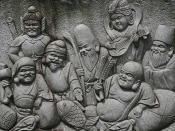Scripture Assignment 2003
Qu 1) Explain how the bible is the written record of Divine Revelation, (include an explanation of oral and written stages, and the meaning of "inspiration").
The bible in it's entirety is considered by Christians (and in part to Jews and Muslims) to be the written record of divine revelation- God revealing himself to mankind. This written record reveals the history of what God has said and done, from his messages to the people of the Old Testament, through records of Christ's life, to the apostles of the New Testament.
Whilst most of the bible was created in written form, many of the bible books (or parts) existed in oral form, long before they were written down. Bible critics study the history, sources, forms, composition, and editing of the bible- all of which make a valuable contribution to the understanding of these texts. However, regardless of the origins and contexts of these writings, the bible and the long process by which it has been produced (including oral traditions, partial texts, early drafts and re-writing) is considered to be "divine"- written "under the guidance of God himself".
(Alexander, 1986) This concept is known as "divine inspiration".
Reference to the divine inspiration of the bible is made in both the Old and New Testaments. Psalm 119 expresses this idea in the Old Testament:
Wonderful are your decrees;
therefore I guard them with all my life.
The revealing of your words gives light
Giving the simple understanding. (Psalm 119:129-130)
In the New Testament, Paul's letters to Timothy make direct reference to the divine inspiration of the scriptures. "All scripture is inspired by God" (2 Tim 3: 16-17). Paul's advice to Timothy also makes reference to the holy scriptures he has known from his infancy "which are able to make you...


